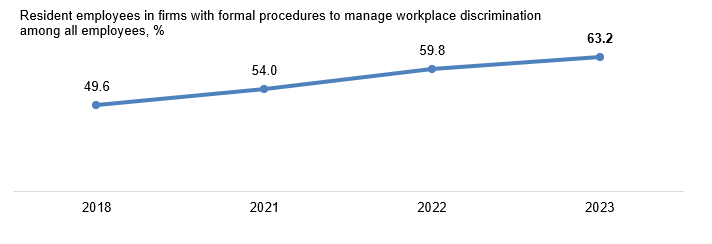Sustained Improvements in Workplace Fairness Standards since 2018
Overview
1 Collective efforts by the Ministry of Manpower (MOM), the Tripartite Alliance for Fair & Progressive Employment Practices (TAFEP), National Trades Union Congress and Singapore National Employers Federation, in promoting fair employment practices with the Tripartite Guidelines on Fair Employment Practices have led to sustained improvements in workplace fairness standards.
2 According to the Fair Employment Practices report by MOM’s Manpower Research and Statistics Department, the proportion of employees and job seekers who faced discrimination declined in 2023 compared to 2022, continuing the downtrend observed since 2018.
Main Findings
Incidence of workplace discrimination continued to fall

![]()
![]() 3 The proportion of employees who experienced discrimination at work declined to 6.0% in 2023, down from 8.2% the year before and 8.5% in 2021. The percentage in 2023 was also about four times lower than 2018 (24.1%). The proportion of job seekers who faced discrimination during their job search in 2023 (23.4%) was also lower than the previous years (2022: 23.8%; 2021: 25.8%; 2018: 42.7%).
3 The proportion of employees who experienced discrimination at work declined to 6.0% in 2023, down from 8.2% the year before and 8.5% in 2021. The percentage in 2023 was also about four times lower than 2018 (24.1%). The proportion of job seekers who faced discrimination during their job search in 2023 (23.4%) was also lower than the previous years (2022: 23.8%; 2021: 25.8%; 2018: 42.7%).
More employees in firms with formal procedures to manage workplace discrimination

![]()
![]()
4 In 2023, 63.2% of resident employees worked in firms with formal procedures to manage workplace discrimination, an increase from 59.8% in 2022. There has been a steady rise in the proportion since 2018 (49.6%), a positive sign toward further improvements in workplace fairness standards.
More to be done to strengthen confidence in reporting workplace discrimination

5 Notwithstanding the increased availability of formal procedures to handle workplace discrimination, the proportion of employees who sought help after experiencing discrimination declined from 35.3% in 2022 to 29.3% in 2023.
6 Employees cited the fear of being marginalised at work or causing work relations to be more awkward (24.4%) as the main reason why they did not seek help when faced with discrimination at work. Some were also concerned with the possibility of a detrimental impact on their careers should they seek help (18.2%).
Conclusion
7 The improvements in overall workplace fairness standards reflect the collective efforts of the Government, employers, workers, and unions in ensuring a fair work environment for all. However, more can be done to strengthen employees’ confidence in reporting workplace discrimination. Under the upcoming Workplace Fairness Legislation, workers will be protected against retaliation should they report discriminatory work practices. Employers will also be required to put in place proper grievance handling processes so that they are well-equipped to support their employees should there be any workplace discrimination. By strengthening protections against workplace discrimination, employers will benefit from a more engaged workforce, strengthen positive reputation, and build a harmonious workplace that attracts and retains talent – all of which leads to better business outcomes.
For More Information
8 The Fair Employment Practices report is released by the Manpower Research and Statistics Department, Ministry of Manpower. The full report and technical notes on the various indicators are available at stats.mom.gov.sg.